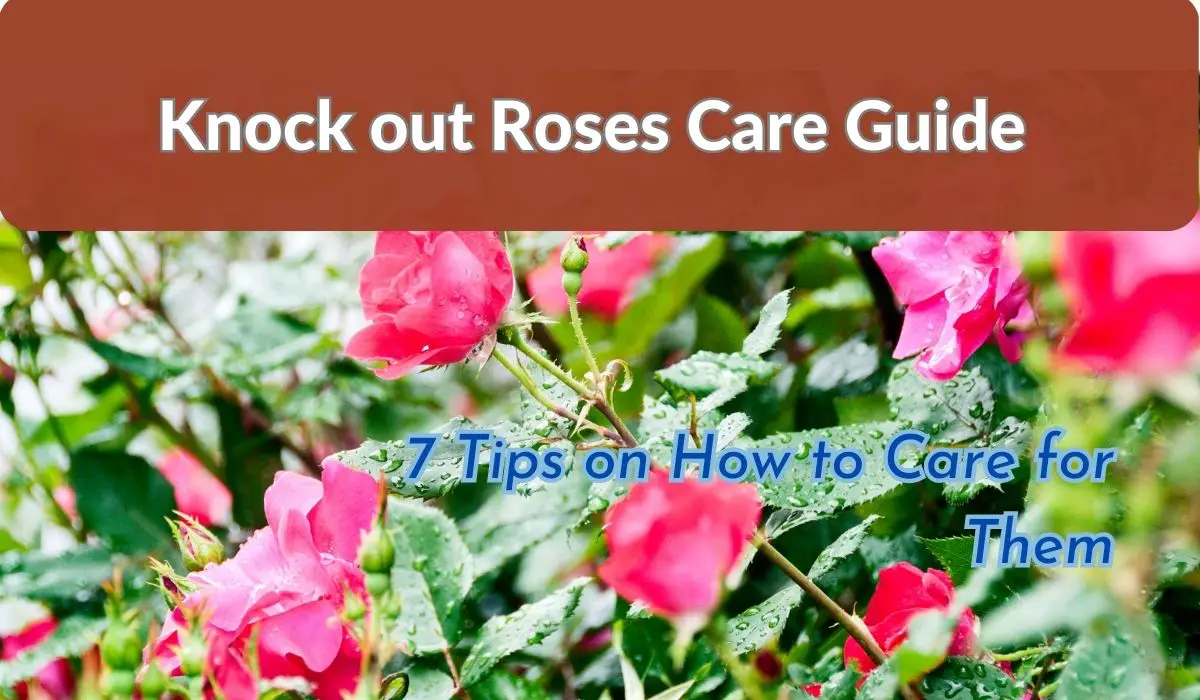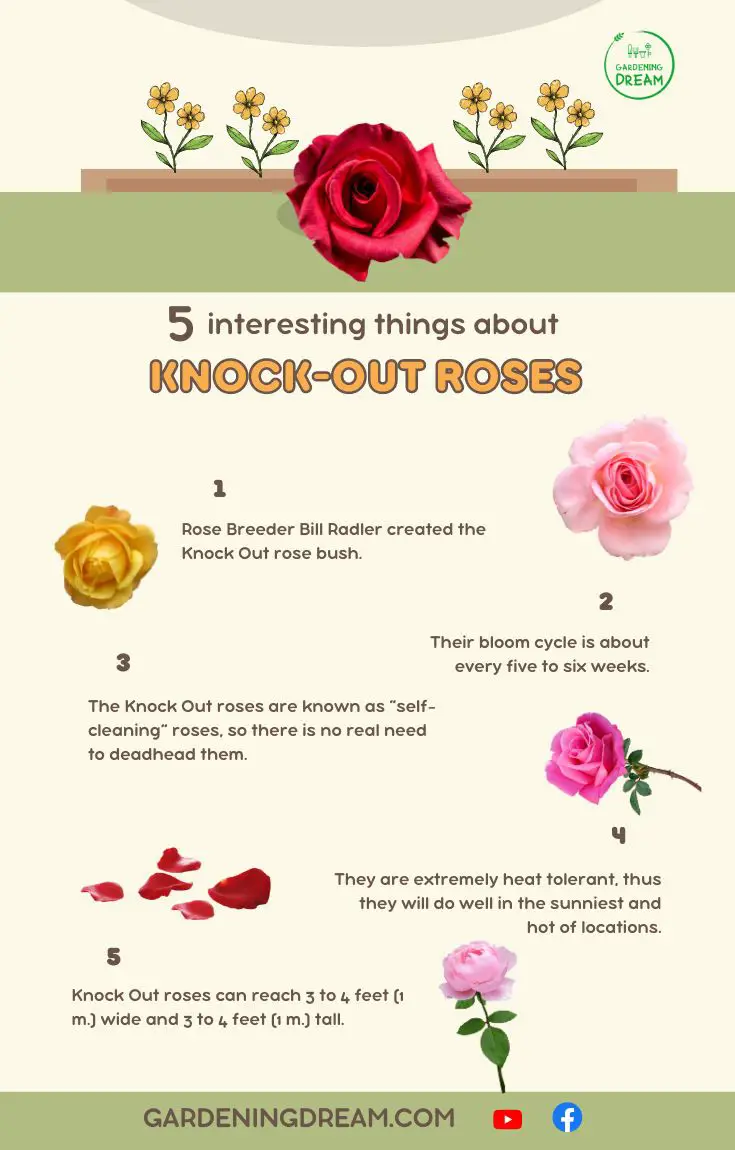Last Updated on April 20, 2023 by Tony Manhart
Providing Knock Out roses care advice is a bit like advising on how to grow cockroaches. This is the rose that will survive a nuclear apocalypse! I have a great fondness for these hardy iconic descendants of the original Knock Out rose bred by the legendary William Radler three and a bit decades ago. Let’s have a look at how to care for these roses.
Quick Summary: Tips On How To Care For Knock-Out Roses
Knock-out roses care tips start with getting watering right – they prefer a long drink of water every once in a while rather than frequent small watering cycles. Caring for Knock out roses is simple, prune them once a year to a height of a foot or so, provide manure and pine needle mulch, and a few cups of organic fertilizer.
What Are Knockout Roses?
Knock Out roses were bred by William Radler in 1989 (released to market). He used a very clever outbreeding system from what I can see to create a hybrid rose with significant genetic input, and, because this was not an inbred rose, the result is it has a powerful genetic toolkit that it can use to fight diseases and pests.
An outbred rose, as with any organism where the breeder tries to bring in genetic diversity, will tend to be more disease resistant and have a broad variety of traits that it can call upon that enable it to withstand a wider range of environmental challenges.
In the future, water will be a scarcer and scarcer commodity, as more and more of us will need it, and the supply is not increasing. The result will be that drought-resistant, disease-resistant, climatically tolerant roses such as the Knock Out Roses will become more important in landscaping. As part of responsible future planning, learning to grow tough low-water plants such as Knock Out Roses, Aloes, Jade plants, Snake plants and the like makes sense.
How Long Do Knockout Roses Live?
Knock Out roses are bush roses and the cultivar was first bred in 1989. Internet wisdom dictates that roses live 10-15 years, which to me is garbage as I am 46 and I know roses that have been around for my whole life and many years before that. There are roses on Earth that are at least 700, but maybe 1000 years old. I know iceberg roses that are at least 70 years old that grow in the town where I was born and are fine due to the desert air. Knock Out Roses are floribunda-type roses like the iceberg, and consequently, we can hypothesize that they should be able to live at least 70 years.
In many cases, roses live shorter lives because a rose bush requires some pruning and specialist care to allow it to survive local stresses and problems. Knock Out roses, and floribunda roses in general, are a bit less fussy about being neglected, and consequently, their survival rates are likely to be quite long even if you treat them badly.
I would imagine, just based on gut feeling knowing similar roses, that you can safely say a well-tended Knock Out Rose will outlive you.
Knock out Roses Care Guide – 7 Infallible Tips
1. Look at the soil
My general belief is that before we think about fertilizing roses, the first point of the knock out roses care guide is to look at the soil. Good rose soil needs to be well-drained and can provide nutrients to the rose. A loose friable loam soil, that has earthworms in it, has a regenerative capacity as the earthworms move stuff from the surface deep into the soil and release nutrients.
When you make rose soil, be sure to mix compost, loam, aged manure, and pearlite into the soil. I normally try to go with a ratio of about a quarter of the total volume to be pearlite. When you plant the rose bush dig a hole that is two feet deep two wide and two long. Fill this hole with the soil mixed above and use the other soil you removed to build a small wall of soil around the hole. This wall of soil acts as a reservoir for occasional watering.
2. Fertilize your Knockout Roses until the first time they flower
Knowing when to fertilize Knockout roses is an important part of their care. If you have built good soil such as this, you will not need to fertilize your Knockout Roses until the first time they flower. It is generally recommended that you do not fertilize roses until their first flower. Whenever you add chemical fertilizers you derive short-term gain and long-term pain problems. Hence I never recommend these concentrated fertilizers.
3. Use organic fertilizer
If you use an organic slow-release fertilizer, you have very little risk to your plants and a lot of rewards. This fertilizer breaks down slowly in the soil providing everything the rose needs, including the bacteria and fungi that a healthy soil requires. It provides both macro and micronutrients, and the fungi and bacteria allow the rose to extract nutrients from the actual soil granules and decaying compost as well.
After your plant has flowered for the first time, you can feed 3/4 of a cup, as per the manufacturers’ instructions, digging this gently into the surface soil below your rose. Repeat this every 6 weeks until the growing season ends. I believe in mulching roses with a mix of aged (two-year-old) manure and pine bark or pine needles. The earthworms in your soil will work this mulch into the top 5-8 inches of soil building a healthy feeding zone for your plants’ roots.
4. Watering Knockout roses: water only if the soil is dry
These roses only need water if they get dry. I cannot stress how important this is. Overwatering any rose, especially a drought-tolerant rose such as a Knockout Rose, is a way to damage, or kill your rose. In an area where you have abundant rainfall during the growing season, you will only need to water the rose if it starts to look dry. Feeling the soil under the rose helps – stick a finger in the soil and if it is moist or wet, do not water the rose. You can use a water meter such as this and try to keep the moisture level so it never gets to the middle of the wet reading. Between Normal and Wet is ideal.
If you live in a dry area with infrequent rainfall you can water the way I am used to. Earlier I mentioned the small dam wall you build around the rose with the soil your dug out of the rose hole. I typically measure one 5-gallon bucket of water and pour this into the hole every week. This water is retained around the rose soil and sinks into it saturating the soil. The rose then can absorb this water rapidly and after a week the soil will be close to dry. You can then repeat the process. As the rose gets bigger, you will have to increase the amount of water accordingly to ensure that the rose survives a week between watering.
5. Prune your Knockout roses in late winter or very early spring
Knockout roses need to be pruned to keep them compact and beautiful. If you do not prune them they get leggy and start to look like a mess and their flowering will be affected. These are quite easy roses to prune as we typically prune them back to a bush that is about a foot high in late winter or very early spring.
To do this you can prune them a bit like a hedge – just use hedge shears to cut the stems off until you have reduced the bush to the 1-foot height you wish it to be at. As time goes on this gets easier and easier as the stems below the pruning line get quite thick and it is easy to see where you need to prune to.
I remove the sticks that fall to the ground and use these in my barbeque as kindling once they are dry. They make great fire starters. You do not want to leave the sticks lying around the trees as this can encourage pests.
6. Use neem oil as a natural pesticide, if necessary
Other than pruning, Knockout roses are very disease resistant and require little disease management. If you do spot a bug or pest, a bit of neem oil never hurts. I have never had to use anything more than this.

7. Mulch your Knockout roses with manure and pine needles
Mulching the roses with aged manure and pine needles, or milled pine bark helps to keep the soil healthy. As mentioned earlier, earthworms will move the organic matter into the soil where it will help drive cycles that release nutrients and help your plant thrive.
In Conclusion: How to Care for Knockout Roses
A knock out roses care instructions start with getting watering right – they prefer a long drink of water every once in a while rather than frequent small watering cycles. Caring for Knock out roses is simple and I find pruning them once a year to a height of a foot or so, providing manure and pine needle mulch, and a few cups of organic fertilizer spread over the growing cycle is all you need to do to keep your Knockout roses beautiful.
Dr. Garth A. Cambray is a Canadian/South African entrepreneur and beekeeper with 28 years of experience in apiculture and specializes in adding value to honey. His Ph.D. research developed a new advanced continuous fermentation method for making mead that has resulted in a number of companies globally being able to access markets for mead. His company, Makana Meadery, exports honey mead to the USA where it is available to discerning connoisseurs. He has also developed technologies to commercially manufacture organic honey vinegar in Zambia for export globally. He holds a few patents globally in the ethanol industry and believes in technology and knowledge transfer for human development and environmental sustainability. One of his proudest achievements is the fact that the wind farm he started at one of his old apiary sites has essentially made his hometown carbon neutral.


